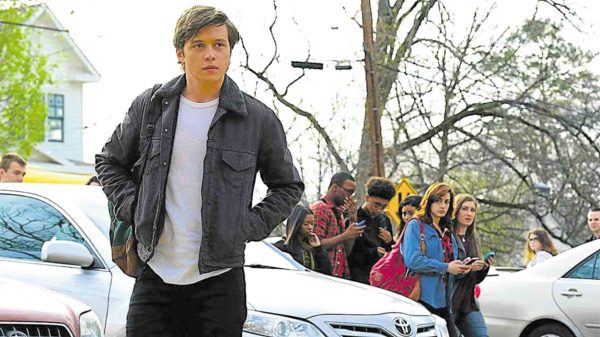Coming-of-age rom-com gets a coming-out twist
Times are a-changing, indeed. After all, it isn’t every day that we get to watch a film about “gender-fluid” young men who share a reluctant smooch, while the SRO crowd watching their story being played out on the big screen cheers them on.
That was the pervasive mood that greeted us when we watched a recent screening of Greg Berlanti’s fresh, funny and feel-good coming-out tale “Love, Simon,” which will have sneak previews tomorrow and on May 1 before its nationwide release on May 9.
The aforementioned kiss is the main protagonist’s bold act of you-and-me-against-the-world defiance that stems from a life shrouded in secrecy.
Hunky 17-year-old high school student Simon Spier (Nick Robinson) may appear to have everything going for him, but appearances can be deceiving: He’s gay—and, while it’s taken him some time to embrace his sexuality, he knew it since he was 13.
Will his confession break the heart of his “perfect” parents—mom (Jennifer Garner) was the class valedictorian, while dad (Josh Duhamel) was the campus quarterback—if they find out that their only son “swishes”? Will his bosom buddies (Katherine Langford, Alexandra Shipp, Jorge Lendeborg Jr.) disown him for manipulating their romantic persuasions to drive the growing attention away from his little-known real identity?
Article continues after this advertisementWorse, Simon has fallen in love with Blue, a similarly closeted chatmate whose real identity he doesn’t know. The production’s coming-out complications get murkier and become fodder for a romantic whodunit as Simon tries to figure out who Blue is: Is he the sensitive pretty boy (Miles Heizer) in his class, the dreamy black jock (Keiynan Lonsdale) he occasionally runs into, or the friendly part-time waiter (Joey Pollari) at the diner?
Article continues after this advertisementIt doesn’t take long before Simon’s potentially hazardous four-year-old secret begins to gnaw at his increasing discontent. It’s a combustible dilemma that reaches its tipping point when Martin (Logan Miller), Simon’s obnoxious coactor in the school play, finds out about his secret e-mail exchanges with Blue and threatens to expose him if he refuses to do a “difficult task” for Martin. What to do?
The film reminds viewers that love in its purest form transcends gender, breaks color lines, and breaches the superficial limitations set by the moral proselytizing of narrow-minded conservatives who are driven by hatred, jealousy and bigotry.
More relevant than it initially appears to be, “Love, Simon” is a film about tolerance and acceptance that doesn’t treat its pertinent themes with a heavy hand. It’s a rousing, coming-of-age story featuring likable actors who inhabit their characters with dignity. There’s certainly more to it than its deceptively light and fizzy sensibility—which is a feat in itself.
To demonstrate: The central characters in many kitsch-free, gay-themed dramas—from Ang Lee’s “Brokeback Mountain” to Luca Guadagnino’s “Call Me by Your Name”—often get “punished” for their sexual orientation.
Even the protagonists of Francis Lee’s Sundance-winning film “God’s Own Country,” 2017’s “other” significant gay flick, are made to endure soul-crushing challenges in the name of l’amour: The wince-inducing drama examines the “brutal” romance that unexpectedly develops between a British sheep farmer (Josh O’Connor’) and the Romanian migrant worker (Alec Secareanu) who works for his family.
This year’s star-studded gay-themed flicks look as promising as they’re thematically grim: In Xavier Dolan’s “The Death and Life of John F. Donovan,” Kit Harrington plays a Hollywood star whose career falls apart when his correspondence with an 11-year-old boy (Jacob Tremblay) gets exposed.
In Desiree Akhavan’s “The Miseducation of Cameron Post” and Joel Edgerton’s “Boy Erased,” both lead characters (portrayed by Chloe Grace Moretz and Troye Sivan, respectively) are forced to undergo gay conversion therapy.
The lesbian films seem just as bleak: Kristen Stewart and Chloë Sevigny share more than just lustful glances in Craig William Macneill’s “Lizzie” (about the infamous ax-wielding Lizzie Borden), while the two Rachels (Weisz and McAdams) find themselves sexually attracted to each other in Sebastian Lelio’s “Disobedience.”
What’s love got to do with it, you ask? If we go by these quirky characters’ motivations, it’s everything!

